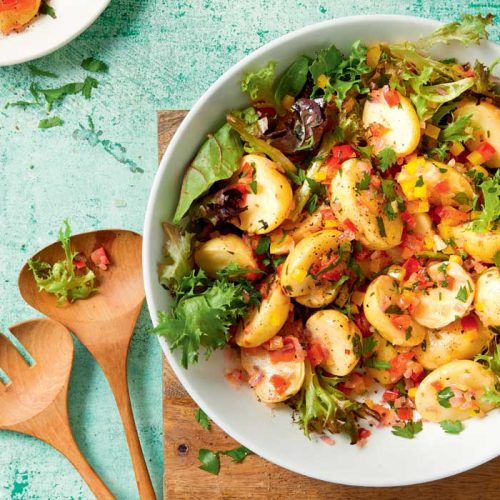
It’s been a frantic day and you’ve barely had time to use the bathroom, let alone eat something substantial. It’s now 9pm and you find yourself at home, tired and hungry. Dietitian Susie Burrell shares her tips for dealing with late-night meals.
With long work days and busy lives, it’s not surprising the evening meal is often eaten after 8pm. This is not good news for our health, as it means the bulk of our calories are being consumed during the second half of the day, when we tend to be relatively inactive socialising or relaxing in front of the TV. The side effects of late-night meals is gradual weight gain, especially if we choose quick, calorie-dense meals like Thai takeaway, pasta, toast or breakfast cereal to satisfy hunger.
Some might wonder why eating the same foods we usually would eat, but later at night, makes weight control more challenging.
It comes down to the fact that the human body is programmed according to a 24-hour circadian rhythm.
This means our metabolism and hormones are programmed to do their work during the day when we are active, then store, build and recover at night when we rest, sleep and regenerate.
In order to maintain our metabolism – the body’s ability to burn calories at its best – ideally we should be eating most of the calories we need during the day, then having 10 to 12 hours of rest, without food, overnight. When it comes to dinner, this means we should be consuming our last meal of the day by 8pm at the latest.
Unfortunately, this is just not possible for many of us, so we need strategies to achieve the right balance between a full and busy life, a social life outside of work and good food choices to stay in the best shape possible. Try the following five tips for making better choices when you do find yourself searching for dinner after a very long day.
1. Swap your meal times
If you regularly find yourself eating dinner after 8pm, consider having your main meal at lunchtime and enjoying a lighter snack in the evening instead. Great lunchtime main meal options include dinner leftovers, a stir-fry with noodles and lean protein, a large meat and salad sandwich or a hot meal from a local cafe or pub that includes vegetables to keep you feeling full and satisfied for up to five hours.
2. Know the best ‘quick meal’ options
There’s a big difference between choosing a high-fat curry or Pad Thai from your local takeaway and ordering stir-fried vegetables. It’s crucial to remember that takeaway meals contain at least 300 calories more than the same meal you’d prepare at home, thanks to the extra oils, sauces and condiments used in a takeaway. If you frequently rely on quick meals purchased on the go, make a concerted effort to choose lighter menu options, such as grilled fish with salad, barbecued chicken with salad or plain vegetable dishes.
3. Prepare extra meals in advance
There is nothing worse than arriving home hungry and having no decent meal options on hand. To prevent this scenario, prepare in advance a soup, stir-fry or baked vegetable dish that you can keep in the fridge or freezer for a quick yet healthy late-night meal. Just as importantly, keep a supply of canned soups, beans, tuna and salmon in your pantry, and at least two salad vegetables in the fridge that you can quickly convert into a nutritious meal.
4. Have frozen options on hand
Fresh is always best, but there are a number of nutritionally sound frozen meal options that allow you to get a healthy, reheated meal on the table in minutes. Frozen salmon fillets, chicken breasts and numerous vegetable options can be put in the oven and ready to eat in less than the time it takes to have a shower. They also give you at least 300 calories fewer than if you’d resorted to takeaway. Another great option for busy people is to order ready-to-go meals from a home delivery service to keep on hand for late-night dinners. Although they’re more expensive, the quality is good and the price often works out to be the same as what you’d spend if you were buying all the ingredients from scratch.
5. Think salad/vegetables and protein
The later you consume your final meal of the day, the lighter it needs to be. Eating heavy, carbohydrate-rich meals late at night is not only related to higher body weight and a higher intake of calories, it can also mean you do not wake up hungry for breakfast the next day. For this reason, choose lighter dinner options such as a small can of fish with vegetables or eggs served with salad. And remember, toast or breakfast cereal is not a meal!
Top 10 late-night dinners
- Omelette or frittata
- Vegetable stir-fry
- Meal-replacement shake
- Tuna or chicken salad
- Salmon or tuna on crackers
- Potato stuffed with tuna and coleslaw
- ¼ barbecue chicken or chicken strips with salad
- Sashimi with seaweed salad
- Bowl of vegetable-based soup
- Four bean mix or corn with mixed salad
www.healthyfood.com










